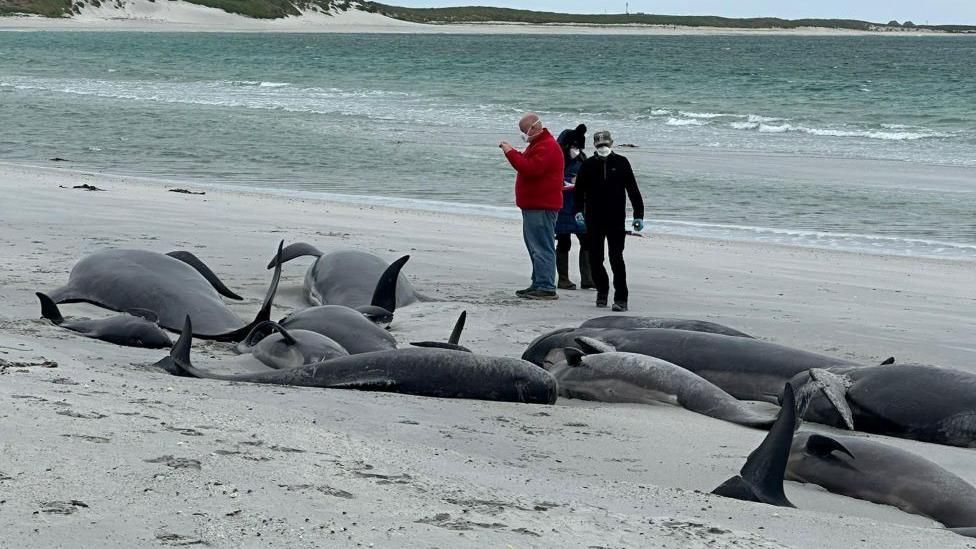Whales to be buried on island after archaeology tests

The whales became stranded last week
- Published
A pod of 77 pilot whales that died after washing ashore in Orkney will be buried at multiple land sites after archaeological tests have been carried out.
The animals were found on the island of Sanday on Thursday following what is thought to have been the largest mass stranding in decades.
The 12 that were found to still be alive were euthanised.
Orkney Islands Council said a minimum of eight different sites were needed, and burial would begin as soon as possible on the island.
But the local authority said tests were needed to avoid disturbing the island's 700 known archaeological sites.
The pod included male whales measuring up to seven metres (22ft) long.
There were also females, calves and juveniles.
Cetacean experts - whose specialise in aquatic mammals - have been examining tissue samples to establish the cause of the stranding.
They were healthy before they came ashore, according to initial findings.
The local authority said disposal of the whale carcasses at sea had been ruled out following advice from environmental regulators.
Scottish Environment Protection Agency (Sepa) guidance was that no more than 10 whales should be buried at each individual pit.
Farmer James Muir has been helping at the scene
The council said in a statement: "We're now further exploring the options on the island around burial, with a minimum of eight different sites needed to meet the requirements set by Sepa.
"Landowners have been coming forward and meetings have been taking place this morning.
"With over 700 known archaeological sites on Sanday, the final sites that are chosen will be determined following archaeological tests - but burial will begin as soon as practicable."
The local authority also praised the "incredible" community response and thanked everyone who had contributed to the effort.
Local farmer James Muir has been helping move the animals with a tractor.
He told BBC Radio Orkney: "It's quite eye-opening to see the share scale.
"I don't think the pictures do it justice until you see it with your own eyes.
"The professionals here are very much on the ball with what needs to be done.
"In times of need we have a very good community that comes behind folk and helps out in any which way we can."
Members of the public have been asked to stay away from the scene.
Pilot whales are social creatures and live in a matriarch-style social structure, with the oldest female seen as having the authority in the pod.
The stranding is thought to be the largest UK stranding since 1927 when 126 out of more than 130 false killer whales died in the Dornoch Firth, in the Highlands.
Last year an entire pod of 55 pilot whales died following a stranding on Lewis.
- Published14 July
- Published12 July
- Published11 July
- Published16 July 2023